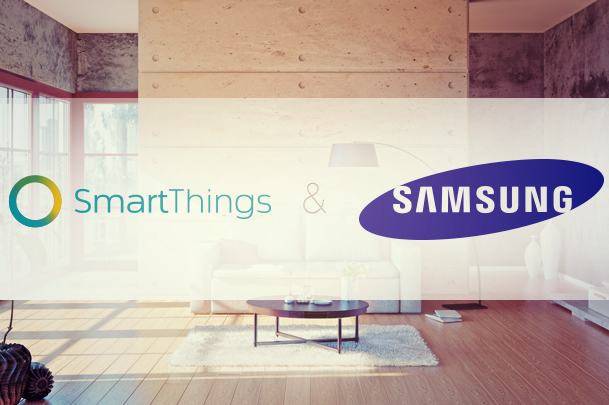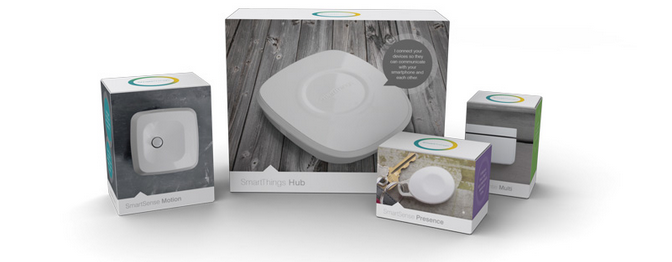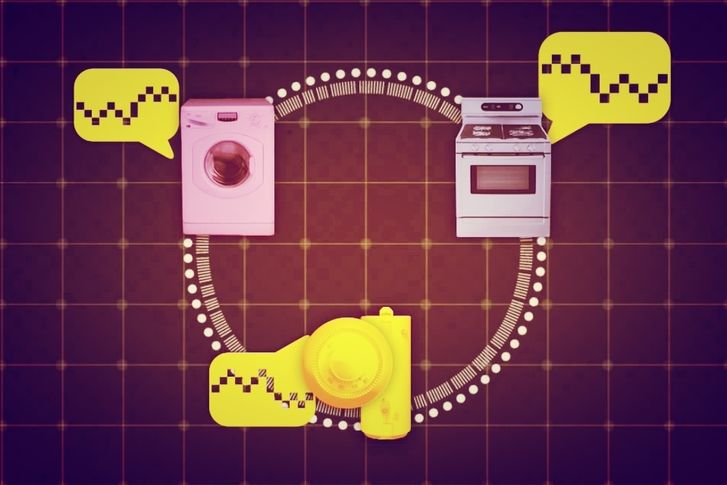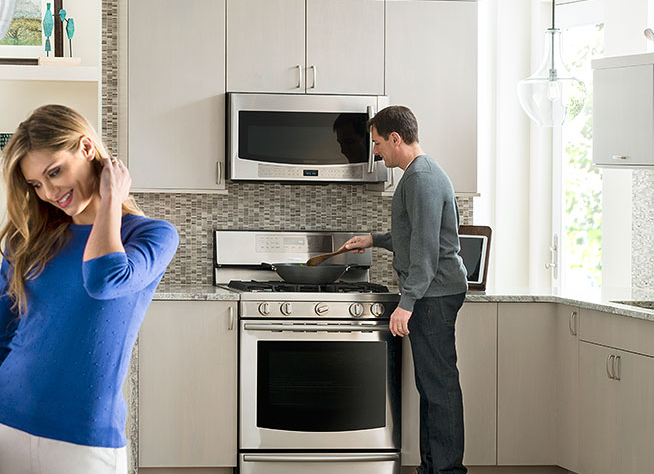Samsung has agreed to buy a home-automation company called SmartThings for a reported $200 million. The deal is a head-scratcher at first blush, but it could also be a genius business move if Samsung involves its appliance business and takes full advantage of the company's technology.
It's safe to say almost every major company - from tech firms to retail stores - have developed a home automation platform or invested in one, so Samsung, naturally, bought SmartThings to stay ahead of the curve. It will now have the resources to make affordable and easy-to-use smart home products as well as the apps to control them.
Well that's all fine and dandy, but you're probably wondering how the buyout will directly affect you and your home. Well, Pocket-lint has explained everything you need to know, below. Keep reading to learn more.
READ: Welcome to Smarthome at Pocket-lint
What is SmartThings?
If you're interested in home automation, then you should really pay attention to a SmartThings. It's a Kickstarter-born startup that offers multifunctional sensors, wide-ranging product compatibility, and a smartphone app that controls everything.
Home-automation kits
More specifically, SmartThings has three different kits. They include the SmartThings Hub, Smart Devices, and SmartApps, among other things. The standalone SmartThings hub costs $99, while the kits start at $199. Once you buy a kit, you'll also be able to add a number of different third-party devices because SmartThings supports both Z-Wave and ZigBee.
These two wireless standards make the SmartThings kits compatible with everything from Phillips Hue lights to Honeywell thermostats. You can also implement IFTTT (If This Then That) recipes, enabling your SmartThings sensors to trigger other IFTTT-supported smart devices and applications such as the Belkin WeMo Switch or even Twitter, etc.
SmartThings is both an affordable and easy way to explore home automation, and unlike some rival services, it doesn't charge a monthly fee.
What is home automation?
Imagine having a house chock-full of smart devices (like a light bulb, coffee pot, and smoke alarm) from multiple manufacturers (like Honeywell and GE), but they can understand each other and work together. Home automation occurs when everyday smart objects in your house are connected and participating together on a single network.
Example
Home automation could allow you to wake up and experience the "ideal" day: wake up to a fresh pot of coffee, for instance, because you've programmed the machine to start brewing before your alarm clock goes off, and your home heater might have also turned on before in order to warm up your bathroom.
SmartThings has three kits that can add a level of home automation to your home. The Home Security Solution kit lets you monitor who is going in or out of doors as well as turn on a light in response to motion, etc. The Home Watch Solution kit identifies potential problems in the home by analyising temperature, vibration, motion, and moisture. And the Family Life Kit keeps track of the comings and goings of loved ones and pets.
All of these connected devices and applications in your home are managed by an automatic system over a single network, enabling you have what is considered a "smart home".
READ: ZigBee and others explained
Why is SmartThings joining Samsung?
Two years ago SmartThings began as a Kickstarter project, and now Samsung has agreed to buy it for a reported $200 million. For SmartThings, the buyout means it can now reach a much bigger number of people more quickly. It'll remain independent - in that the brand, approach, business model, and product model will remain the same - but now it'll have a direct relationship with Samsung, one of the largest consumer electronics platform in the world.
That said, SmartThings will operate within Samsung’s Open Innovation Center.
Global reach
Both Samsung and SmartThings haven't yet announced a roadmap or any potential integrations or upcoming products, but they have indicated they are interested in addressing universal human needs. In an interview with The Verge, Alex Hawkinson, co-founder and CEO of SmartThings, said his company offers the most advanced and interesting applications but the primary issue is just awareness in consumers.
"It's very inexpensive to get these profound benefits. When you put that together with Samsung's global muscle, we have the exposure to help that happen right now," Hawkinson explained.
In other words, Samsung likely bought SmartThings for its "advanced and interesting applications" in home automation, which might one-day integrate with Samsung's existing smart devices, while SmartThings probably agreed to the acquisition so it could expand globally and get more consumers on board the home automation trend.
Revenue and relevancy
It's worth noting that Samsung might have purchased SmartThings after looking into more ways of generating revenue. After all, the South Korean manufacturer has suffered from dwindling smartphone sales in recent months. It is even projecting up to a 26 per cent decline in smartphone profits year-over-year. Also, Samsung knows that it should stay competitive in the home-automation space in order to maintain relevancy.
Google has Nest. Apple has HomeKit. And now Samsung has SmartThings.
READ: Samsung in talks to buy SmartThings
How will Samsung's SmartThings purchase affect your house?
As we mentioned earlier, SmartThings is known for its Home Security kit and hub. These gadgets and products let you connect home devices - like lights, stereos, and door locks - to an automated system. You can then control everything directly from SmartThing's app on your mobile phone.
With SmartThings, Samsung could integrate products from its home appliance business such as ovens, refrigerators and dishwasher. You would therefore be able to control Samsung's products as well as third-party smart devices, all through the SmartThing's hub and app.
Although Samsung has manufactured connected appliances, it hasn't;t offered a complete platform for smaller things like door locks and light sensors. SmartThings enabled Samsung to offer those basic elements with tie-ins to existing products.
What are some alternatives to SmartThings?
Over the last couple years, many big companies have launched similar home-automation products with hubs that can control smart devices. Lowe's has a smart home system called Iris, for instance, while Home Depot has backed Wink, a home-automation platform from New York-based invention shop Quirky. Staples also has its own platform, called Connect, and Best Buy is allegedly ready to back a platform called Peq.
READ: Apple Homekit explained
Google's Nest
Don't forget that Google acquired Nest Labs, the makers of the Nest smart learning thermostat, for $3.2 billion in January 2014. And then in June 2014, Google announced a new developer program for the Nest division. Called "Works with Nest", the program provides a set of APIs that manufacturers can include in their smart devices in order to let you link and remote control them as well as integrate them with Nest and other Google products.
Apple's Homekit
Apple has also developed something called the Homekit framework in iOS 8, so it could simplify the current state of home automation. With Homekit, Apple essentially created a common language that smart devices (also called accessories) from any manufacturer can understand and support. Homekit also leverages Siri, Apple's intelligent voice assistance, letting you control smart devices with just your voice.





